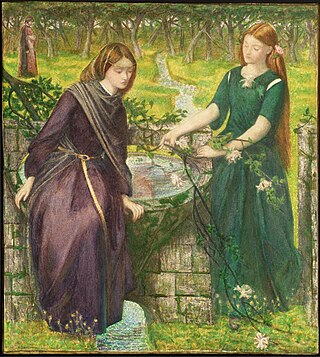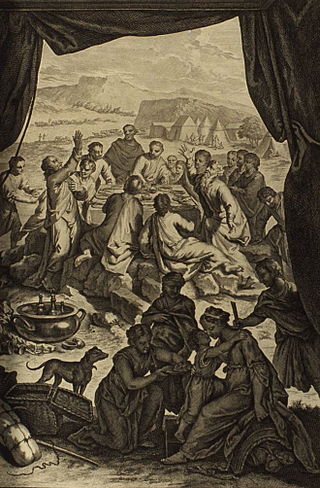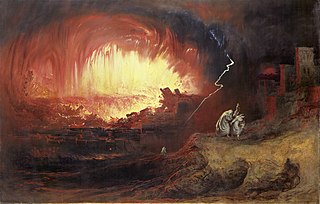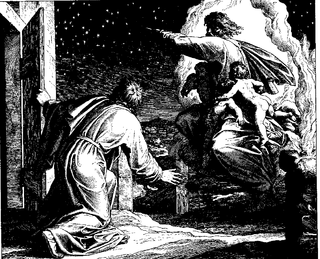Related Research Articles

Jacob, later given the name Israel, is regarded as a patriarch of the Israelites and is an important figure in Abrahamic religions, such as Judaism, Christianity, and Islam. Jacob first appears in the Book of Genesis, where he is described as the son of Isaac and Rebecca, and the grandson of Abraham, Sarah, and Bethuel. According to the biblical account, he was the second-born of Isaac's children, the elder being Jacob's fraternal twin brother, Esau. Jacob is said to have bought Esau's birthright and, with his mother's help, deceived his aging father to bless him instead of Esau. Later in the narrative, following a severe drought in his homeland of Canaan, Jacob and his descendants, with the help of his son Joseph, moved to Egypt where Jacob died at the age of 147. He is supposed to have been buried in the Cave of Machpelah.

The biblical Book of Genesis speaks of the relationship between fraternal twins Jacob and Esau, sons of Isaac and Rebecca. The story focuses on Esau's loss of his birthright to Jacob and the conflict that ensued between their descendant nations because of Jacob's deception of their aged and blind father, Isaac, in order to receive Esau's birthright/blessing from Isaac.

Leah appears in the Hebrew Bible as one of the two wives of the Biblical patriarch Jacob. Leah was Jacob's first wife, and the older sister of his second wife Rachel. She is the mother of Jacob's first son Reuben. She has three more sons, namely Simeon, Levi and Judah, but does not bear another son until Rachel offers her a night with Jacob in exchange for some mandrake root. Leah gives birth to two more sons after this, Issachar and Zebulun, and to Jacob's only daughter, Dinah.

Aram-Naharaim is the biblical term for the ancient land of the Arameans referring to the region along the great bend of the Euphrates river. Aram-Naharaim is also mentioned as Nahrima of the Arameans in the El-Amarna letters.

Laban, also known as Laban the Aramean, is a figure in the Book of Genesis of the Hebrew Bible. He was the brother of Rebekah, who married Isaac and bore Jacob. Laban welcomed his nephew, and set him the stipulation of seven years' labour before he permitted him to marry his daughter Rachel. Laban tricked Jacob into marrying his elder daughter Leah instead. Jacob then took Rachel as his second wife, on condition of serving an additional seven years' labour.

Lech-Lecha, Lekh-Lekha, or Lech-L'cha is the third weekly Torah portion in the annual Jewish cycle of Torah reading. It constitutes Genesis 12:1–17:27. The parashah tells the stories of God's calling of Abram, Abram's passing off his wife Sarai as his sister, Abram's dividing the land with his nephew Lot, the war between the four kings and the five, the covenant between the pieces, Sarai's tensions with her maid Hagar and Hagar's son Ishmael, and the covenant of circumcision.

Vayeira, Vayera, or Va-yera is the fourth weekly Torah portion in the annual Jewish cycle of Torah reading. It constitutes Genesis 18:1–22:24. The parashah tells the stories of Abraham's three visitors, Abraham's bargaining with God over Sodom and Gomorrah, Lot's two visitors, Lot's bargaining with the Sodomites, Lot's flight, the destruction of Sodom and Gomorrah, how Lot's daughters became pregnant by their father, how Abraham once again passed off his wife Sarah as his sister, the birth of Isaac, the expulsion of Hagar, disputes over wells, and the binding of Isaac.

Bethuel, in the Hebrew Bible, was an Aramean man, the youngest son of Nahor and Milcah, the nephew of Abraham, and the father of Laban and Rebecca.

Chayei Sarah, Chaye Sarah, Hayye Sarah, or Hayyei Sara, is the fifth weekly Torah portion in the annual Jewish cycle of Torah reading. It constitutes Genesis 23:1–25:18. The parashah tells the stories of Abraham's negotiations to purchase a burial place for his wife Sarah and his servant's mission to find a wife for Abraham's son Isaac.

Toledot, Toldot, Toldos, or Toldoth is the sixth weekly Torah portion in the annual Jewish cycle of Torah reading. The parashah tells of the conflict between Jacob and Esau, Isaac's passing off his wife Rebekah as his sister, and Isaac's blessing of his sons.

Vayetze, Vayeitzei, or Vayetzei is the seventh weekly Torah portion in the annual Jewish cycle of Torah reading. It constitutes Genesis 28:10–32:3. The parashah tells of Jacob's travels to, life in, and return from Harran. The parashah recounts Jacob's dream of a ladder to heaven, Jacob's meeting of Rachel at the well, Jacob's time working for Laban and living with Rachel and Leah, the birth of Jacob's children, and the departure of Jacob's family from Laban.

Vayishlach or Vayishlah is the eighth weekly Torah portion in the annual Jewish cycle of Torah reading. In the parashah, Jacob reconciles with Esau after wrestling with a "man." The prince Shechem rapes Dinah, whose brothers sack the city of Shechem in revenge. In the family's subsequent flight, Rachel gives birth to Benjamin and dies in childbirth.

Miketz or Mikeitz is the tenth weekly Torah portion in the annual Jewish cycle of Torah reading. It constitutes Genesis 41:1–44:17. The parashah tells of Joseph's interpretation of Pharaoh's dreams, Joseph's rise to power in Egypt, and Joseph's testing of his brothers.
Milcah was the daughter of Haran and the wife of Nahor, according to the genealogies of Genesis. She is identified as the grandmother of Rebecca in biblical tradition, and some texts of the Midrash have identified her as Sarah's sister.

In the Bible, Melchizedek, also transliterated Melchisedech or Malki Tzedek, was the king of Salem and priest of El Elyon. He is first mentioned in Genesis 14:18–20, where he brings out bread and wine and then blesses Abram and El Elyon.
Aram is a son of Shem, according to the Table of Nations in Genesis 10 of the Hebrew Bible, and the father of Uz, Hul, Gether and Mash or Meshech. The Book of Chronicles lists Aram, Uz, Hul, Gether, and Meshech as descendants of Shem, although without stating explicitly that Aram is the father of the other four.
The priestly covenant is the biblical covenant that God gave to Aaron and his descendants, the Aaronic priesthood, as found in the Hebrew Bible and Oral Torah.

The ruins of the city of Harran, called Haran in the Hebrew Bible, might lie within present-day Turkey. Haran first appears in the Book of Genesis as the home of Terah and his descendants, and as Abraham's temporary home. Later biblical passages list Haran among some cities and lands subjugated by Assyrian rulers and among Tyre's trading partners.

Rebecca appears in the Hebrew Bible as the wife of Isaac and the mother of Jacob and Esau. According to biblical tradition, Rebecca's father was Bethuel the Aramean from Paddan Aram, also called Aram-Naharaim. Rebecca's brother was Laban the Aramean, and she was the granddaughter of Milcah and Nahor, the brother of Abraham. Rebecca and Isaac were one of the four couples that some believe are buried in the Cave of the Patriarchs, the other three being Adam and Eve, Abraham and Sarah, and Jacob and Leah.

In the account of Terah's family mentioned in the Book of Genesis, Nahor II is listed as the son of Terah, amongst two other brothers, Abram and Haran. His grandfather was Nahor I, son of Serug. Nahor married the daughter of his brother Haran, Milcah, his niece. They may all have been born and raised in the city of Ur: the biblical account states that "Haran died before his father Terah in the land of his birth, in Ur of the Chaldeans".
References
- ↑ Albright, Stone, 180; B. Maisler, in: Zion, 11 (1946), 3.
- ↑ Kraeling, Emil Gottlieb Heinrich. Aram and Israel, Columbia University Press, 1918
- ↑ "Paddan-Aram - Bible Blender".
- 1 2 3 Bromiley, Geoffrey W., The International Standard Bible Encyclopedia, Wm. B. Eerdmans Publishing, p.627, 1915 ISBN 9780802837851
- ↑ Richard Elliott Friedman. The Bible with Sources Revealed, 71, 76, 82, 109, 113. New York: HarperSanFrancisco, 2003
- ↑ Baden, Joel S. The Composition of the Pentateuch, p.235, Yale University Press, 2012 ISBN 9780300152630
- ↑ Gunkle, Hermann and Biddle, Mark E., "Genesis", Mercer University Press, 1997 ISBN 9780865545175
- ↑ Friedman 87, 89